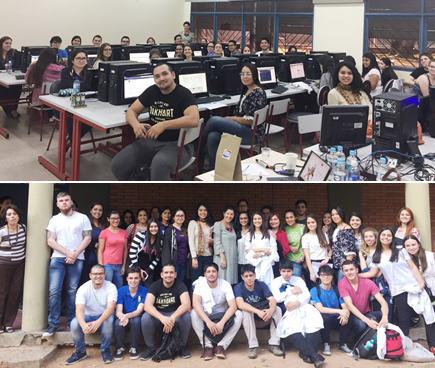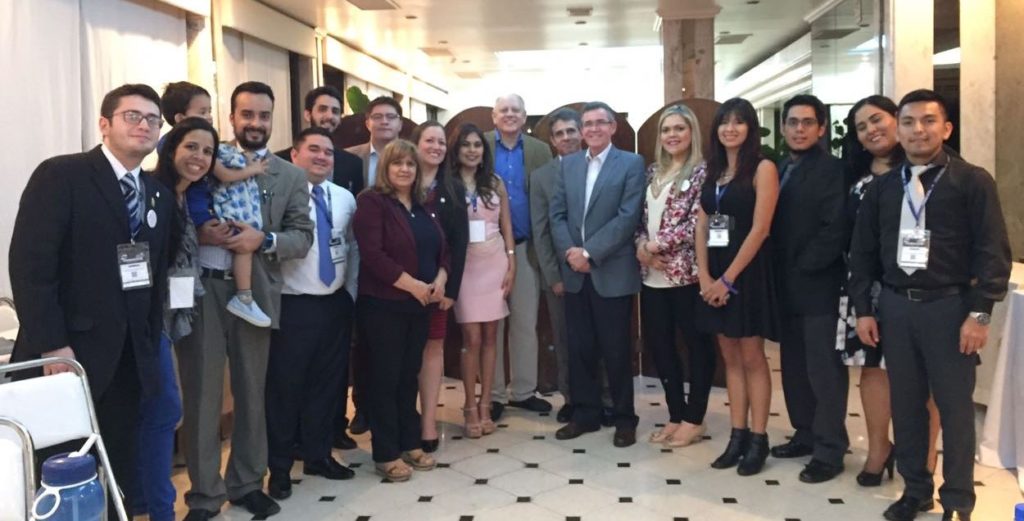About two thousand medical students from several Latin American countries gathered in Asuncion, Paraguay, for the XXXII Congreso Científico Internacional de la Federación Latinoamericana de Sociedades Científicas de Estudiantes de Medicina (FELSOCEM), from September 19 to 23.
The theme of the congress, “Medical urgencies and emergencies: think, act, and save,” calls attention to the increase in variety and quantity of cases that require immediate medical care, in which the physician training is decisive for reestablishing the patients’ health.
Thus, considering the amount of knowledge and skills that the new medical professional may need to care for the health of the population, the facilitated and quick access to scientific and technical information, updated and placed in the context of the realities found in several situations of medical urgencies and emergencies, is certainly a component that can make a difference in the quality of clinical decisions made by these young physicians. Undoubtedly, in order to benefit from the information that will underpin their decisions, the young physicians need to be acquainted with and know how to use this information, besides having an adequate infrastructure for the timely accessing it.
This is where BIREME and its information products and services come in. Services such as the VHL (Virtual Health Library), and the Latin American and Caribbean Health Sciences Literature (LILACS) are open access public goods, but still not broadly known and used by students or young physicians.
 Fully aware of this reality, FELSOCEM and the Facultad de Ciencias de la Salud de la Universidad Católica Nuestra Señora de Asunción (SOCEMUCA), with the support of PAHO/WHO Representation in Paraguay, included two activities by BIREME in the conference program:
Fully aware of this reality, FELSOCEM and the Facultad de Ciencias de la Salud de la Universidad Católica Nuestra Señora de Asunción (SOCEMUCA), with the support of PAHO/WHO Representation in Paraguay, included two activities by BIREME in the conference program:
- Workshop about access to and use of scientific information in health, duration six hours, carried out as a pre-conference activity at SOCEMUCA, with the purpose of developing capabilities for access to information by means of formulating research questions and preparing search strategies using the primary sources of information in health, mainly LILACS. About 60 students participated in the workshop, which was essentially practical and was led by Verônica Abdala, Manager of Services and Sources of Information at BIREME/PAHO/WHO;
- As part of the academic program of the conference, a lecture by the Director of BIREME, Dr. Diego Gonzalez about BIREME and its 50 years of history promoting access to health information. In this lecture, Dr. González presented to the medical students the major advancements of the Center along these 50 years to fulfill its mission of democratizing information, knowledge, and scientific evidence. The progression of the Center, from physical facilities to the virtual world, the technological developments, and the primary products and services of translation of knowledge were the main topics of the conference, which encouraged the students to continue exploring the possibilities provided by BIREME.
According to Dr. Margarita Brizuela-Cabral, professor of this Facultad, “the experience of participating at the BIREME course at FELSOCEM Conference was excellent, as we were able to teach a theoretical and practical course on bibliographic search. At this event, we had students from the Facultad en Ciencias de la Salud Universidad Católica Nuestra Señora de la Asunción, at the initial phase of their Medical career, who participated in the disciplines of Medical Informatics, Methodology, and Epidemiology.”
To keep on actively connecting with the medical students of Latin America and the Caribbean, a working day was developed along with the Advisory Council of FELSOCEM, composed of professionals from different countries, who participated personally and virtually. It was called Sesión Anual de Médicos Líderes Investigadores “Contribución a la Promoción de la investigación Cientifica en América Latina en el marco de la colaboración de la OPS-FELSOCEM”. The event was inaugurated by Dr. Pedro López, a Consultant in Health Systems and Services, and by Epifania Gómez Torales, responsible for the Knowledge Management Center, both from the PAHO/WHO office in Paraguay. The presentations made during the event were given by Dr. Alejandro Salicrup, a PAHO/WHO Consultant in Washington, DC, and Dr. Diego González, Director of BIREME. Both focused on research and how it can be strengthened with the contribution of the advisory group from FELSOCEM.
During the meeting, Dr. Fiorella Inga Berrospi – President of the Advisory Board of FELSOCEM – emphasized: “it is of great relevance for this type of meeting of young Latin American researchers as well as the approach of PAHO, once that we dedicate a space to rethink the current situation of health research in our Region, considering the strengths and weaknesses with which we trust to continue contributing to the generation of knowledge of our workspaces. In this sense, BIREME allowed us to know in detail all the search tools and access to information that we have today, motivating us to continue on the path of research, seeking to improve the health conditions of our populations ”
 According to Dr. González, “this was a moment for reflection and commitments to continue to contribute with young physicians, so that they might influence the undergraduate students to develop research projects, make them accessible, and have access to them in their medical practice.”
According to Dr. González, “this was a moment for reflection and commitments to continue to contribute with young physicians, so that they might influence the undergraduate students to develop research projects, make them accessible, and have access to them in their medical practice.”